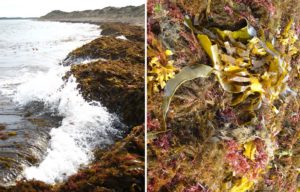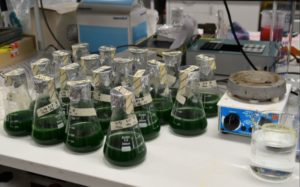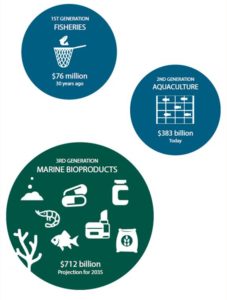
Feeding a hungry planet, new medications to tackle diseases ranging from cancer to Parkinson's, bioplastics, cosmetics, and curbing climate-changing greenhouse gas emissions - these are a snapshot of the opportunities created by a $59 million injection of federal funding for the national Marine Bioproducts Cooperative Research Centre.
The wide-ranging, decade-long R&D program will transform Australia's emerging marine bioproducts sector into a sustainable, clean, and globally competitive industry.
The Marine Bioproducts Cooperative Research Centre (MB-CRC) – an initiative collaboratively conceived and driven by Flinders University – includes 68 Australian and international research, industry and government partners working together to expand existing enterprises and drive new, high-value products, commercial technologies. The MB-CRC will create employment opportunities around Australia, including in Indigenous and regional communities.
Backed by the Government of South Australia and the SA Research and Development Institute (SARDI), a division of Primary Industry and Regions SA (PIRSA), the new CRC will have its headquarters at Flinders University at the Tonsley Innovation District in Adelaide.
Over the next 10 years, MB-CRC projects will attract more than $270 million in value, including more than $70 million in direct cash support from 49 participating industry partners, and further cash and in-kind support from 12 research entities, two State Government organisations and five third-party participants.
"As the Australian marine bioproducts industry heads for $1 billion turnover a year by 2030, this new national industry-driven research and development collaboration platform is set to position Australia at the cutting-edge of this burgeoning industry," says MB-CRC chair John Gunn.
Flinders University Vice-Chancellor Professor Colin Stirling says the CRC will see Flinders researchers in South Australia playing a leading role in a national research initiative spanning Tasmania, Victoria, New South Wales and Queensland.
"Flinders University is delighted and excited to be driving this major $270 million-plus national Cooperative Research Centre enterprise with a truly global scope.
 "This outstanding initiative will generate enormous economic and job creation opportunities for Australia in general and South Australia in particular. We estimate more than 26,000 jobs will result from capitalising on the scaling up of a sustainable and export-oriented 'blue' economy based on existing and new products and markets supported by advanced manufacturing," Professor Stirling says.
"This outstanding initiative will generate enormous economic and job creation opportunities for Australia in general and South Australia in particular. We estimate more than 26,000 jobs will result from capitalising on the scaling up of a sustainable and export-oriented 'blue' economy based on existing and new products and markets supported by advanced manufacturing," Professor Stirling says.
MB-CRC bid lead and research director Flinders University Professor Wei Zhang says the potential is huge.
"Australia has the world's third-largest marine area with much of its rich and diverse marine bioproducts yet to be explored and developed for new and improved health, nutrition, aquaculture, agriculture and biomaterial applications.
"The global marine biotech industry is rapidly expanding, and is projected to be worth $780 billion by 2035. We are particularly excited because this program will enable our researchers to build the marine bioproducts industry with a focus on jobs growth and sustainability," Professor Zhang says.
The MB-CRC consortium brings together a broad cross-section of industry, including some of Australia's major agri-businesses, SMEs and two global chemical industry giants, with some of the country's leading scientists and researchers.
 Dr Steve Meller, CEO and founder of Industry partner CH4 Global, says: "The MB-CRC will be the disruptive hot house that grows innovation, early adoption and collaboration between industry partners. CH4 Global believes it will lead to a transformational change in the way we farm the oceans."
Dr Steve Meller, CEO and founder of Industry partner CH4 Global, says: "The MB-CRC will be the disruptive hot house that grows innovation, early adoption and collaboration between industry partners. CH4 Global believes it will lead to a transformational change in the way we farm the oceans."
"The marine environment has a massive number of untested compounds that could be used as the basis of novel bio-products, and joining the MB-CRC allows us to work with researchers and other industry partners to explore this potential," says Ms Leta LaRush, BASF Agricultural Solutions Head of Marketing, Australia & New Zealand.
"As the world's largest chemistry company and a leader in agricultural solutions for Australian farmers, BASF is always looking for more sustainable chemistry," she says.
The Australian Government's CRC Program supports industry-led collaborations between industry, researchers and the community. The focus is on research and development that will have commercial uses.
The program aims to:
- Improve competitiveness, productivity, and sustainability of Australian industries, especially where Australia is competitive and in government priority areas,
- Use high-quality research to solve industry-identified problems, and
- Encourage and help SMEs to take part in collaborative research.
 Professor Robert Saint, Deputy Vice-Chancellor (Research) at Flinders University says Australia is ideally placed to claim a bigger share of this important global sector, contributing to economic growth and jobs.
Professor Robert Saint, Deputy Vice-Chancellor (Research) at Flinders University says Australia is ideally placed to claim a bigger share of this important global sector, contributing to economic growth and jobs.
"There is already strong demand for marine products in Asia and untapped potential across the western world for more sustainable foods, medicines, agricultural products and indeed as-yet undiscovered opportunities.
"Flinders is delighted to be able to capitalise on its research strengths by harnessing this 68-strong partnership with potential to transform how we can live healthy sustainable lives.
"Our world-class scientific expertise in marine science, aquaculture and biotechnology - in league with 12 research, 49 industry and other partners here and abroad - forms a solid launching pad for this exciting new venture.
"We look forward to taking many new researchers on board with us on this transformative journey," Professor Saint says.
About the MB-CRC: The $270m Marine Bioproducts CRC is a consortium of 68 partners conceived and driven by Flinders University. It will fast-track the growth of Australia's next generation of marine bioindustries to meet rapidly growing global demand for certified, safe and sustainable products including plant-based proteins, nutraceuticals, omega 3 oils, cosmetics, agrochemicals, bioplastics, and more.






